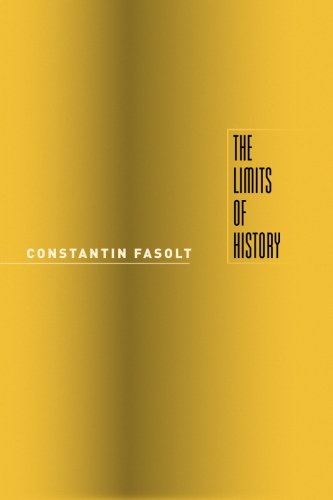Background
Fasolt, Constantin was born on March 18, 1951 in Bonn, Germany. Son of Nikolaus and Vera Fasolt.


( History casts a spell on our minds more powerful than s...)
History casts a spell on our minds more powerful than science or religion. It does not root us in the past at all. It rather flatters us with the belief in our ability to recreate the world in our image. It is a form of self-assertion that brooks no opposition or dissent and shelters us from the experience of time. So argues Constantin Fasolt in The Limits of History, an ambitious and pathbreaking study that conquers history's power by carrying the fight into the center of its domain. Fasolt considers the work of Hermann Conring (1606-81) and Bartolus of Sassoferrato (1313/14-57), two antipodes in early modern battles over the principles of European thought and action that ended with the triumph of historical consciousness. Proceeding according to the rules of normal historical analysis—gathering evidence, putting it in context, and analyzing its meaning—Fasolt uncovers limits that no kind of history can cross. He concludes that history is a ritual designed to maintain the modern faith in the autonomy of states and individuals. God wants it, the old crusaders would have said. The truth, Fasolt insists, only begins where that illusion ends. With its probing look at the ideological underpinnings of historical practice, The Limits of History demonstrates that history presupposes highly political assumptions about free will, responsibility, and the relationship between the past and the present. A work of both intellectual history and historiography, it will prove invaluable to students of historical method, philosophy, political theory, and early modern European culture.
http://www.amazon.com/gp/product/022610124X/?tag=2022091-20

(In 1311, at the council of Vienne, William Durant the You...)
In 1311, at the council of Vienne, William Durant the Younger (c. 1266-1330), the French bishop and count, demanded that general councils ought to meet every ten years in order to place effective limits on the papal plenitude of power because 'what touches all must be approved by all'. This is the first systematic interpretation of William Durant's remarkable project to transfer supreme legislative authority from the papacy to general councils. It suggests that the conciliar theory has a more ambivalent complexion than is sometimes recognized. It confirms, on the one hand, that constitutional ideas were deeply embedded in the tradition of the church, which enabled Durant to anticipate the council of Constance by more than a hundred years. On the other hand, Durant attributed an authority to ancient law that overrode his republican ideas, sapped their vitality, and launched him on a pursuit of the true meaning of the law that could end only in his transformation into an historian and a reluctant champion of monarchy. William Durant the Younger's ideas thus help us to understand both the origins of the conciliar theory and the transition from late medieval reform movements to early modern humanism and princely sovereignty.
http://www.amazon.com/gp/product/0521392853/?tag=2022091-20
Fasolt, Constantin was born on March 18, 1951 in Bonn, Germany. Son of Nikolaus and Vera Fasolt.
Master of Arts, Columbia University, 1976. Doctor of Philosophy with distinction, Columbia University, 1981.
Preceptor history Columbia University, New York City, 1979—1981, lecturer history, 1981—1983. Assistant professor history department history University of Chicago, 1983—1990, associate professor history department history, 1990—1998, professor history department history, since 1999. Visiting professor history University of Virginia, Charlottesville, 1999—2000, Notre Dame (Indiana) University, 2002—2003.
Fellow Woodrow Wilson International Center for Scholars, Washington, 2003—2004.
( History casts a spell on our minds more powerful than s...)
(In 1311, at the council of Vienne, William Durant the You...)
Member of Society for Reformation Research, Sixteenth Century Studies Conference, Medieval Academy of America, The History Society, Conference for the Study of Political Thought, American History Association, American Cusanus Society.
Married Prema Arasu, 1998. Married Svetlana Obuch, 1983 (divorced 1996). Married Tatiana Ledkovsky, 1977 (divorced 1982).
Children: Nicholas, Catherine.
